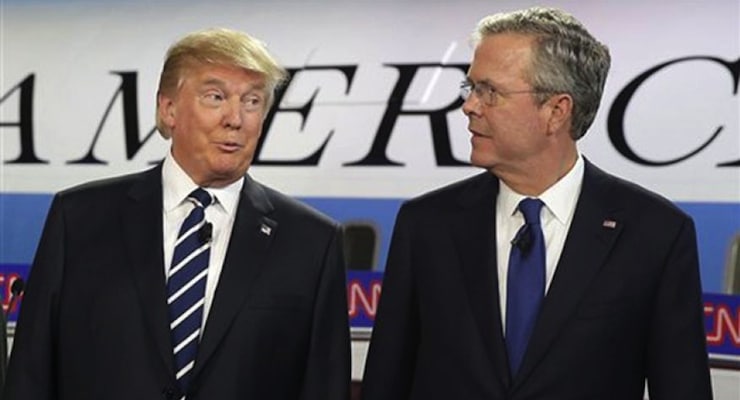

Republican presidential candidates, businessman Donald Trump, left, and former Florida Gov. Jeb Bush talk together before the start of the CNN Republican presidential debate at the Ronald Reagan Presidential Library and Museum on Wednesday, Sept. 16, 2015, in Simi Valley, Calif. (PHOTO: AP/Chris Carlson)
Neither George W. Bush, the Republican Party nominee in 2000 and 2004, nor Jeb, the dethroned Prince of Wales, will be in Cleveland. Nor will John McCain or Mitt Romney, the last two nominees.
These former leaders would like it thought that high principle keeps them away from a GOP convention that would nominate Donald Trump. Petulance, however, must surely play a part. Bush Republicans feel unappreciated, and understandably so.
For Trump’s nomination represents not only a rejection of their legacy but a repudiation of much of post-Cold War party dogma.
America crossed a historic divide and entered a new era. Even should Trump lose, there is likely no going back.
Trump has attacked NAFTA, MFN for China and the South Korea trade deal as badly negotiated. But the problem lies not just in the treaties but in the economic philosophy upon which they were based.
Free-trade globalism was a crucial component of the New World Order, whose creation George H. W. Bush called the new great goal of U.S. foreign policy at the United Nations in October of 1991.
Bush II and Jeb are also free-trade zealots.
But when the American people discovered that the export of their factories and jobs to low-wage countries, and sinking salaries, were the going price of globalism, they rebelled, turned to Trump, and voted for him to put America first again.
Does anyone think that if Trump loses, we are going back to Davos-Dubai ideology, and Barack Obama’s Trans-Pacific Partnership is our future? Even Hillary Clinton has gotten the message and dumped TPP.
Economic nationalism is the future.
The only remaining question is how many trade deficits shall America endure, and how many defeats shall the Republican Party suffer, before it formally renounces the free-trade fanaticism that has held it in thrall.
The Bush idea of remaking America into a more ethnically, culturally, diverse nation through mass immigration, rooted in an egalitarian ideology, also appears to be yesterday’s enthusiasm.
With Republicans backing Trump’s call, after the terrorist attack in San Bernardino, for a moratorium on Muslim immigration, and the massacres in Paris, Nice and the Pulse Club in Orlando, Florida, diversity seems to be less celebrated.
Here, the Europeans are ahead of us. Border posts are being re-established across the continent. Behind the British decision to quit the EU, was resistance to more immigration from the Islamic world and Eastern Europe.
On Sunday, French President Francois Hollande was booed at memorial services in Nice for the hundreds massacred and maimed by a madman whose family roots were in the old French colony of Tunisia.
Marine Le Pen of the National Front, who wants to halt immigration and quit the EU, is running far ahead of Hollande in the polls for next year’s elections.
As for the foreign policies associated with the Bushes, the New World Order of Bush I and the crusade for global democracy of Bush II “to end tyranny in our world” are seen as utopian.
Most Republicans ask: How have all these interventions and wars improved our lives or our world?
With 6,000 U.S. dead, 40,000 wounded, and trillions of dollars sunk, the Taliban is not defeated in Afghanistan. Al-Qaida and ISIS have outposts in a dozen countries. Iraq, Syria, Libya and Yemen are bleeding and disintegrating. Turkey appears headed for an Islamist and dictatorial future. The Middle East appears consumed in flames.
Yet, despite Trump’s renunciation of Bush war policies, and broad support to talk to Russia’s Vladimir Putin, the neocons, who engineered many of the disasters in the Middle East, and their hawkish allies, seem to be getting their way for a new Cold War.
They are cheering the deployment of four battalions of NATO troops to the Baltic states and Poland, calling for bringing Sweden and Finland into NATO, pushing for sending weapons to Ukraine, and urging a buildup on the Black Sea as well as the Baltic Sea.
They want to scuttle the Iranian nuclear deal and have the U.S. Navy confront China to support the rival claims of Vietnam, the Philippines, Malaysia, Brunei and Indonesia to rocks and reefs in the South China Sea, some of which are under water at high tide.
Who represents the future of the GOP?
On trade and immigration, the returns are in. Should the GOP go back to globalism, amnesty or open borders, it will sunder itself and have no future.
And if the party is perceived as offering America endless wars in the Middle East and constant confrontations with the great nuclear powers, Russia and China, over specks of land or islets having nothing to do with the vital interests of the United States, then it will see its anti-interventionist wing sheared off.
At issue in the battle between the Party of Bush and Party of Trump: Will we make America safe again, and great again? Or are globalism, amnesty, and endless interventions our future?
Do we put the world first, or America First?







jim cobb / July 19, 2016
Yes turn out the lights and just in the Bushes
/